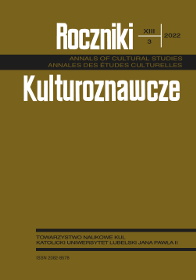Encouragement to Macrobius: Transmission of Philosophical Ideas in Culture
Abstract
The article presents a philosophical and literary work which, despite its compiler character, played an important role in the history of culture. Thanks to him, important ideas of ancient philosophy were transferred to another era, that is, the Middle Ages. This work is a commentary on the VI book of De re publica by M.T. Cicero of A.T. Macrobius: Commentarii in Ciceronis Somnium Scipionis.
This piece was for a long time the only trace of the mentioned piece by Cicero. It was also one of the main sources by which the ideas of Platonism and Pythagoreism as well as elements of ancient astronomical, musicological and mathematical doctrines reached the Middle Ages. This work was commented on very often by medieval scholars and is present in the minds of many of them. The numerous issues raised by Macrobius met with the interest of authors who know his Commentum. They took up macrobian threads and developed and transformed them according to their own way of thinking. Macrobius’ comment was repeatedly rewritten and commented on in the Middle Ages, as evidenced by the number of preserved manuscripts. In this article, I want to present an initial outline of the theological, anthropological and psychological views mediated by the commentary on the transmission of the Middle Ages.
References
Arystote, De la generation et de la corruption, text etabli et traduit par Charles Mugler. Paris: Les Belles Lettres 1966.
Arystoteles. „De anima”. W: Aristotelis Opera, Aristoteles grecae ex recognitione Immanuelis Bekkeri, edidit Academia Regia Borussica, 1831-1070. Editio altera quam curavit Olof Gigon, Berolini apud W. de Gruyter et Socios, 1960.
Arystoteles. „Fizyka”. W: Arystoteles. Dzieła wszystkie, t. 2. Przeł. Kazimierz Leśniak. Warszawa: PWN 1990.
Arystoteles. „O częściach zwierząt”. W: Arystoteles. Dzieła wszystkie, t. 3. Przeł. Paweł Siwek. Warszawa: PWN 1992.
Arystoteles. „O powstawaniu i niszczeniu”. W: Arystoteles. Dzieła wszystkie, t. 2. Przeł. Leopold Regner. Warszawa: PWN 1990.
Arystotelis De partibus animalium libri quattuor, ed. B. Langkavel. Lipsiae: Teubner 1868.
Arystotelis. De physica auscultatione, ed. J.B. Camotius. Venetiis 1551.
Baeumker, Claus. Vitelo, ein Philosoph und Naturforscher des 13. Jahrhunderts. [seria: Beiträge zur Geschichte der Philosophie des Mittelalters t. 3, z. 2]. Munchen, 1995.
Cyceron. Pisma filozoficzne, t. II. Tłum. Wiktor Kornatowski. Warszawa: PWN, 1960.
Homer, Iliada. Tłum Franciszek Ksawery Dmochowski, Kraków: Wydawnictwo Literackie, 1972.
Kowalewska, Małgorzata. „Kilka uwag na temat Commentarii in Ciceronis Somnium Scipionis Makrobiusza Ambrosiusza Teodozjusza”. Annales Universitatis Mariae Curie-Skłodowska. Sectio I, Philosophia-Sociologia 42, nr 2 (2017): 75-88.
Kowalewska, Małgorzata. „Wielka rzecz wymaga wielkiej przestrzeni”. Ethos 26, nr 4 (2013): 97-115.
Kowalewska, Małgorzata. Bóg – Kosmos – Człowiek w twórczości Hildegardy z Bingen, Lublin: Wydawnictwo UMCS, 2022
Kroll, Josef. Die Lehren des Hermes Trismegistos. [seria: Beitärge zur Geschichte der Philosophie des Mittelalters t. 12, z. 2-4]. Munchen: Aschendorff, 1914.
Lewis, Clive Staples. Odrzucony Obraz, Wprowadzenie do literatury średniowiecznej i renesansowej. Tłum. Witold Ostrowski, Kraków: Znak, 1995
Macrobii Ambrosii Theodosii „Commentarii in Ciceronis Somnium Scipionis et Excerpta e Libro De Differentiis et Socoetatibus gearci latinique verbi”. W: Ambrossii Theodosii Macrobii Opera quae supersunt, t. I, red. Lodovicus Ianus, Quaedlinburgi et Lipsiae, 1848.
Martianus Capella. De nuptis Philologiae et Mercurii, IX, ed. U.F. Koop, Frankfurt am Main 1836.
Planton. Państwo. Przeł. Władysław Witwicki. Warszawa: Akme, 1991.
Plato. De re publica B. Jowett: Platos Republic. Editet with notes and essays by the lote B. Jowett. M. A and Cambel M.A. LL. D. in three volumes. Oxford. At the Clarendon Press 1894.
Platon. Fajdros. Przeł. Władysław Witwicki. Warszawa: Unia Wydawnicza „Verum”, 2004.
Platon. Fedon. Przeł. Władysław Witwicki. Warszawa: Unia Wydawnicza „Verum”, 2004.
Platon. Gorgias. Przeł. Paweł Siwek. Warszawa: PWN, 1991.
Platon. Timajos. Przeł. Pawel Siwek. Warszawa: PWN, 1986.
Plotyn. Enneady. Tłum. Adam Krokiewicz. T. 1-3, Warszawa: Akme, 2000; t. 4-5, Warszawa: Akme, 2001-2003; t. 6, Warszawa, Akme, 2003.
Porfiriusz. Grota Nimf. Tłum. Piotr Ashwin-Siejkowski. Kraków: Wydawnictwo WAM, 2006.
Procli Diadochi in Platonis Timeum commentaria, wyd. E. Diehl, t. I-III. Leipzig: Teubneri, 1903-1906.
Proklos, Elementy teologii, Tłum. Robert Sawa. Warszawa: Akme, 2002.
Proklos. Institutio (Elementatio) Theologica, wyd. gr.-ang. W: E.R. Doods. The Elements of Theology, Oxford: Oxford University Press, 1963.
Schedler, Matthaeus. Die Philosophie des Macrobius und ihr Einfluss auf die Wissenschaft des christlichen Mittelalters. Beiträge zur Geschichte der Philosopphie des Mittelalters 13(1). Münster: Aschendorffsche Verlagsbuchhandlung, 1916.
Verdeyen Paul i Romana Guarnieri (red.). Porete Margaretae. Speculum simplicium animarum. Le mirouer des simples âmes. Corpus Christianorum. Continuatio mediaevalis 69. Turnholti: Brepols, 1986
Wilhelm z Lorris, Jan z Meun. Powieść o róży. Tłum. Małgorzata Frankowska-Terlecka, Teresa Giermak-Zielińska Warszawa: Państwowy Instytut Wydawniczy, 1997.





